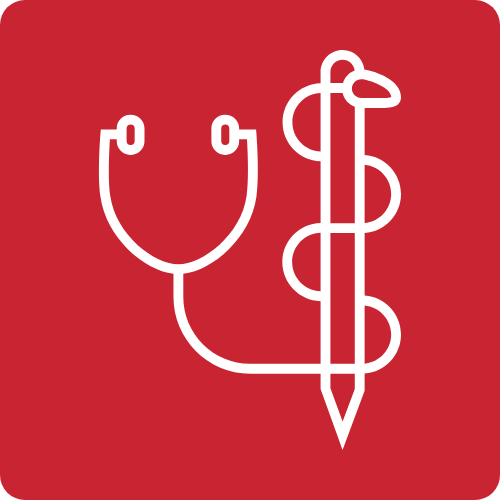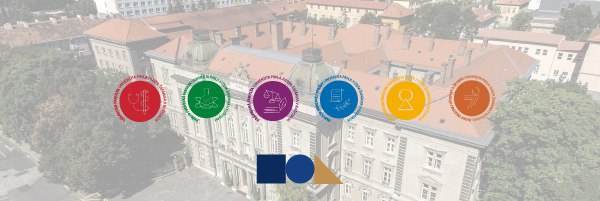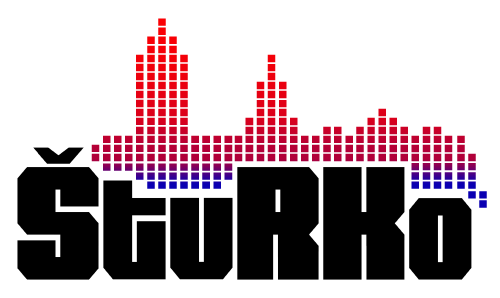The primary task of our department had been to ensure the proper content and organisation of teaching process of Medical physiology for students of General and Dental medicine of Medical faculty since 1949. The Medical physiology as a discipline about functioning of the healthy organism had a very important position in the teaching process because it had been integrating theoretical subjects and it was the basis for the pre-clinical and all clinical subjects, too. This is the reason why physiology teaching was orientated from the very beginning on complex approach to the human organism respecting the processes dynamics influenced by the internal and external factors. To reach this goal the method of problem orientated teaching process was used, it was continually developing, modernised and enriched by up to date foreign and home knowledge. The lectures, practical lessons and seminars were upgraded due to the development of teaching techniques such as teaching movies, slides, magnetic tape records, bio-telemetric transfer of specific experiment and examinations. The content of practical lessons was a result of the clinical medicine request to apply physiological knowledge, the necessity to use technical equipment and to approve manual laboratory skills. There were used the most modern examinational methods and experimental demonstrations during the practical lessons (X-ray sciascopy of thorax during the respiratory cycle, angiography, heart catheterisation and the measurement of heart volumes etc.).
The alternative way of teaching was involved into the teaching process. It is used PC network in our labs so this way the students can work either individually or in groups with PC models that are focused on the systems and processes of the organism. This is the method how the students can enter the regulating mechanisms and create model situations with step analysis of the process and with final evaluation. Also textbooks considerably participated in reaching pedagogical aims: Practical lessons in physiology revised in 1969, 1974, 1990, 2001, 2002, 2015.
The students of UPJS Medical faculty in Košice gained the first Slovak textbook of physiology written by the first head of department: I. Ivančo: “Physiology for medical students “part I.-III., 1975 during the redevelopment of university studies in the school year 1977-1978. In this textbook the students could obtain the newest findings in the field of systemic and organ physiology and mainly deeper insight into cellular, membrane and molecular mechanisms of human physiological functions. The textbook offers basic and perspective importance of bio-cybernetics, physical and mathematical physiological functions modelling and also application of PC technique in physiology and medicine. Some chapters of the textbook were taken over into the national Czech book: S.Trojan et al., Physiology : The textbook for medical faculties in 1988 and its Slovak version in 1992. The department of medical physiology provides also education of somatology in the Nursing school in Košice, of physiology for psychological students of UPJS Faculty of Arts and last years also participates in teaching of students of Technical university in Kosice (biomedical engineering). Pedagogic activity of UPJS MF has been expanded into teaching of foreign students in English since school year 1992-1993. Foreign students are provided by special English textbooks: : Practical lessons in Physiology, Part I. 1993, Part II. 1994 and revision was in 1998.
The educational process was optimised and modernised mainly by former employees: Prof. MUDr. I. Ivančo, CSc., mim. Prof. Š. Kujanik, CSc. a Doc. MUDr. I. Bračoková. Seven university teachers and 2 professors are nowadays responsible for pedagogic and scientific activity in the department: Prof. MUDr. V. Donič, CSc. and Prof. MUDr. Z. Tomori, DrSc., 3 associate professors: Doc. MUDr. M. Pallayová, PhD., Doc. RNDr. P. Švorc, CSc., Doc. MVDr. A. Lukačinova, PhD. Fourteen employees vastly participate on pedagogic and scientific work therefrom 5 assistants: MUDr. I. Bačová, PhD., RNDr. S. Grešová, PhD., RNDr. K. Kassayová, CSc., RNDr. J. Štimmelová, MUDr. Igor Peregrim PhD. and 3 PhD students: MUDr. A. Brandeburová, Mgr. R. Tokárová and MUDr. Martina Gáborová. We must mention other non-teaching and technical employees: R. Medvecová, Z. Dulínová, M. Haľamová, E. Jurková which also participate on reaching pedagogic and scientific aims of our department. Our university teachers improved their qualification and pedagogic activities by taking part in foreign study stays: Prof. MUDr. V. Donič, CSc., a Prof. MUDr. Z. Tomori, DrSc in Moscow (1962), in Oxford (1967), in Hannover, in USA (1973), in Sydney (1979) and in Baltimore, USA (2014), RNDr. Soňa Grešová, PhD. in Palermo (2007). They also took part in many congresses in 5 continents with active participation (Sydney, New York, Haifa, Cairo, Shanghai, Cambridge, London, Warsaw).
Our scientific research is aimed to cardiorespiratory relations in experiment and also in clinical medicine involving Chrono-physiology and sleep medicine.
The experimental part is focused on influence of ventilator disorders (hypoventilation, apnoea) on change of heart electric stability, on change of autonomic nervous system tone and on upraise, development and interruption of hearth arrhythmias. The nearest purpose of the experiment is to review and promote possible cardio-protective effect of preconditioning, the phenomenon of endogenous cardio protection by hypoventilation and apnoea and reflex normalisation of different functional disorders. Prof. MUDr. V. Donič, CSc,, a Prof. MUDr. Z. Tomori, DrSc., and mim. prof. R. Beňačka CSc. By assistance of other co-workers described and analysed gasp-like strong inspiration reaction caused by irritation of nasopharynx – so called aspiration reflex. Prof. J. Korpáš, prof. M. Tatár, prof. J. Hanáček and prof. J. Jakuš from Medical faculty in Martin discovered diametrical different strong expiration reaction caused by irritation of larynx so called expiration reflex. These two reflexes were compared with cough that is caused by irritation of lower respiratory tract and which is known as a “watchdog of the lungs”. The possible application of these three strong respiratory reflexes in animal experiments and in clinical practice is studied by a few scientists of Medical faculty in Košice and in Martin.
In the clinical part of the research there were observed influences of psychical and physical load same as the stay in different altitudes with hypoxic states on autonomic nervous system tone and on the hearth arrhythmias appearance in healthy individuals and in patients with sleep breathing disorders or circadian respiratory insufficiency. Mainly we are observing the importance of respiratory reflexes in upraise, diagnostics, treatment and prevention of cardiorespiratory disorders (hypertension, collapses and various forms of cardiorespiratory failure).
Employees of the department are systematically solving the question of teaching modernisation and intensive scientific research in the field of cardiorespiratory relations, sleep medicine and chrono-physiological issues. Outcomes of these activates were published in 6 monographies and in more than 2500 articles with references altogether about 3000 up to 2015 and including this year. Employees of the department suggested to become sleep medicine the compulsory interdisciplinary subject (it used to be optional one) for students of medical faculty from the third year and above within the new proposed KEGA (Cultural and educational grant agency) project in 2015. The compulsory education of sleep medicine should enable improvement of the diagnostics and treatment of sleep breathing disorders. It should allow progress of diagnostic and prevention of this diseases in a way of perspective home treatment controlled by distant diagnostic and therapeutic centre.
Prof. MUDr. V. Donič, PhD. is the head of department of medical physiology, subdean of Medical faculty UPJS for scientific and research work and referee for the subject normal and pathological physiology for PhD. study, habilitation and also inauguration. Prof. MUDr. Z. Tomori, DrSc, Doc. MUDr. M. Pallayová, PhD. and Doc. RNDr. P. Švorc, CSc. are the members of committee for defense of PhD. study. MUDr. A. Brandeburová , Mgr. D. Tokárová and MUDr. Martina Gáborová are the current PhD. students in internal form.
Employees of the department participated in more scientific projects, as a TEMPUS Project, VEGA, APVV, COST Action B 26. Within the centres for excellency they solved 2 projects dealing with biomagnetism and observation of state of marginalised inhabitants which were financed by structural EU fund (CEEPM and CEMIO).
A few employees of the departments took part in various control organs of specialised communities of national or international meaning. Professors V. Donič, Z. Tomori and other 5 representatives from Medical faculties in Martin and in Bratislava founded Sleep laboratory within the TEMPUS project in Košice in 1993 and then in Bratislava and in Martin after their 2-week study stay in Antwerp, Dublin and Strasbourg. They published the textbook of sleep medicine “Tomori Z, Redhammer R, Donič V. et al.”: The basics of sleep medicine, VLA Košice in 1999, 359 p. They also organised 2 congresses in Košice for the propagation of sleep medicine for Middle- and Easter- European countries in 2002 and 2005. They took part in the establishment of Slovak society of sleep medicine in 2013 with more than 60 members that are working in almost 17 registered Sleep labs in Slovakia.






